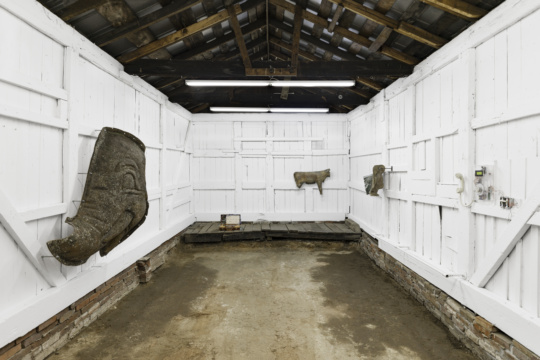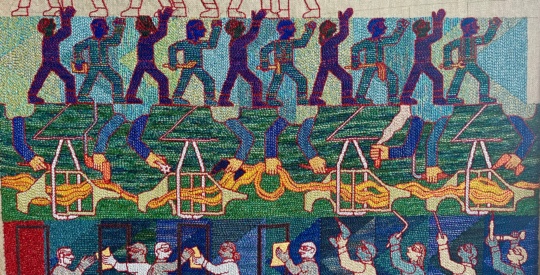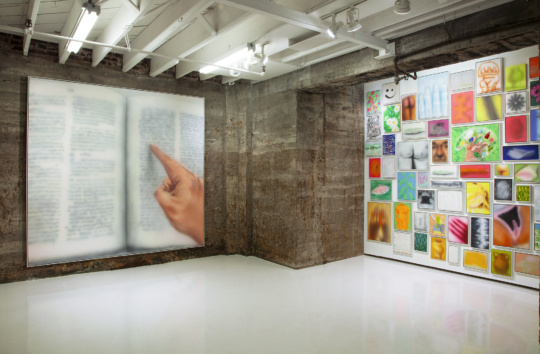
On any given night in Atlanta’s Grant Park neighborhood, one can walk past the house with “Grocery” painted on its side. Though not a peep is discernible from the street, press your ear against the side door and hear the sounds of live music. This incongruous bit of magic continues inside.
An hour before show time, music-lovers start trickling in, settling themselves on well-worn couches and an eclectic mix of vintage furniture. While attendees greet each other the musicians start setting up, often joining in on conversations once the instruments have been attended to. Just as conversation peaks, Matt Arnett—owner and resident of this house-cum-hangout—calls for everyone’s attention, introduces the artists, and the evening of world-class music begins.
The Grocery on Home concerts began two and a half years ago. When Arnett moved into the former grocery store, he immediately realized its potential as a place to join friends and music together. He began by reaching out to musician friends in Athens, Georgia, Birmingham, Alabama, and Lexington, Kentucky. The concerts were announced via word of mouth within Arnett’s circle of friends. As all good things go, friends told friends, expanding the rotating audience-list. Musicians spread the word too, letting friends in other cities know about this intimate and unconventional place to perform, where the host would put you up for the night and pass the hat without taking a cut.
It’s a far cry from the price-gouging rampant at music venues today, and a much more pleasant experience than playing to an ambivalent crowd more interested in drink specials than music. And it’s taken off. Driven by a musicians-first-ethos, the Grocery on Home has become a hub for music in Atlanta, connecting musicians from Athens to New York.
These days, Arnett has become a curator and coordinator of musical evenings at Atlanta music and art establishments like Eddie’s Attic and the High Museum of Art. I caught up with Arnett over email to find out how the Grocery has s evolved over the years.
Lilly Lampe: You’ve told me that when you began the Grocery, it wasn’t a concept, just a way to get people together to listen to good music. Are you surprised at how it’s expanded?
Matt Arnett: The nice thing about the Grocery is that it can’t really expand in size. When I first started having people over to listen to music, I had to really convince people that the artist was going to be good. The idea of house concerts was new to a lot of people around here. People had a hard time believing that competent artists would play for such a small group of people. These days, I don’t have to work so hard to convince my friends that the music is going to be good. If they’ve been before, they know it will be great and that the other people sitting around them will be like-minded people.
When I started it (with my friend Chad Crowley), I figured that I couldn’t be the only person in town who wanted to really hear music in this way. I’m surprised, a bit, by how right I was about that. It’s funny—the music industry has always dictated to audiences and listeners how music will be delivered to them. In the last decade, audiences have started having more of a say in how and when they want their music delivered. The Grocery is just one tiny part of that.

LL: On average, how many concerts are there at Grocery each month?
MA: That changes so much. Between one to four. There have been a few months that I’ve had daytime events which has made the number higher, but generally I try to have events infrequently enough that they remain special. During certain times, like March of last year, I had a few more than usual. The month of South By Southwest I had a lot of friends coming through town on their way to or from Austin. Those months are unusual.
LL: As the Grocery grows, is there a push to become more established or to grow outside of your home into a permanent public venue?
MA: I’ve thought a lot about that, but don’t really have any plans to do that. If someone approached me with a space and a plan, I’d probably be open to it, but it isn’t something I’m pursuing. I do plenty of projects with visual art and music at more traditional spaces, and the Grocery is a place that my friends and their friends can still get together and enjoy music and each other. As more people share their Grocery experiences with their friends, we all get to meet more and more interesting people.
The size of the audience at any one event at the Grocery will never grow, though the number of people who are able to come overall certainly has. Each event is RSVP only, so the numbers are always the same. When I first started having people over to hear music, friends would call me the day of the event and say, “I want to come tonight and bring a friend.” That was usually fine. Most friends now know that by the day of an event, I’m probably not taking reservations anymore.
LL: How did the Grocery shows extend into organizing events at Eddie’s Attic and the High?
MA: I am a big fan of Eddie Owen, the founder of Eddie’s Attic. I’ve gone there for years and seen some great shows. Over the years, Eddie has come and gone from the Attic. Within the last few years, he started doing shows in Duluth, at the Red Clay Theatre. Those shows are called Eddie Owen Presents. I highly recommend making the trip out there to catch a show.
I was a judge at the wonderful Bi-Annual Shootout and had such a great time. I saw some amazing music and was just hooked. Eddie had hosted the open-mic nights at the Attic, but had moved on to the Red Clay Theatre, which left the Attic without a host for their open-mic nights. I grew up in Atlanta and have long admired Alex Cooley, who is the new owner of the Attic. I got to know Alex last year and he and the Attic’s co-owner, Dave Mattingly, asked if I would be open to hosting the open-mic nights.
Being at Eddie’s and seeing so many young, talented performers coming to open-mic nights made me start thinking about ways to give those artists a better platform. Andrew Hingley, who does the booking for Eddie’s Attic, and I started discussing that, and those discussions led to the Young Artists Showcase, which began in December. The next one is February 17th, and has six phenomenal young musicians including Faye Webster.
I also had this idea, which grew out of some discussions I had with Molly McDowell (the director of the Westabou Festival in Augusta), to showcase more Southern musicians and performers. There are so many people in our region doing wonderful things and I wanted to find a way to bring their work to larger audiences. Musicians like Minton Sparks and Anis Mojgani, Anna and Elizabeth (and their Cranky show), Jim White, Cicada Rhythm, The Skipperdees, and so many others need to be heard. That idea grew into Grocery on Home Presents Southern Storytellers: Live from Eddie’s Attic. It is going to become a monthly event, which will highlight great artists from our region. The hope is that people will come to the events, not because they are already a fan of the performer, but because they will hear something great. That’s hopeful, but I don’t think unrealistic.
The next one is February 10th and will feature Ben Sollee and Ed McClanahan, the great Kentucky writer, with very special guests The Skipperdees, twin 20-year old sisters from Oak Ridge, TN. I thought I was their biggest fan but have since learned that their mom and one other person like them more. I’ll settle for being their third biggest fan.
Curating the music for Culture Shock at the High Museum came about through my relationship with the Education and Programs Department. I’ve worked with a lot of museums over the years, and the High’s Education Department is one of the best in the country. I’ve been a big fan of what they do and the chances they take, all in the effort to get more people to engage with art. We also worked together a little bit to bring Kathleen Hanna to Atlanta last year and also to bring two friends, Bill Adler and Cey Adams, to the High for an event to celebrate the release of their book, Def Jam 25.

LL: At the Grocery on Home, you pass a ‘hat’ for donations for the artists but never take a commission. Will the Grocery ever become a money-generating venture? Do you accept a fee for organizing shows at Eddie’s and the High and other venues?
MA: Yes, we pass a corned beef box from Uruguay around the room and people donate to the musician. The music industry has changed so much in the last decade and it has become increasingly harder for musicians to make a living. The Grocery is just one small way I am trying to give back to musicians, who are such a vital part of our cultural fabric. I won’t ever change that at the Grocery. I get so much more out of each experience at the Grocery than I could ever put a price on. I didn’t get paid to do the High event, though Eddie’s does pay me to host the open-mic night..
LL: How has your mission evolved over the years?
MA: I grew up in a house that was filled with art and culture. My dad routinely entertained people at the house, from museum groups, universities, artists, athletes, and the like. I met so many interesting people growing up, many times around my own dinner table or in our living room. I remember one event at the house and Thornton Dial, Lonnie Holley, Mose Tolliver, Bessie Harvey, Charlie Lucas, Joe Light, and so many other wonderful artists were there. The great James “Son” Thomas played music to throngs of Atlanta art lovers. I can’t even remember who else was there, but it was incredible. And it was at my own house. I wanted to have a place like that for my kids.
I didn’t have a mission when I started and quite frankly, and I still don’t. But my ideas about the Grocery have continued to evolve. I travel a lot for work. Every city I went to I’d encounter something special or unique, whether it was underground art shows, or intimate supper clubs, or groups of people doing cool things around the arts. I would always rave about the things I’d done in Seattle, or Portland, or San Francisco, or other places I was returning from and complain that there weren’t things like that in Atlanta. My girlfriend (Amanda) would always tell me to stop complaining and do something about it. And she was right. I do so many projects in other cities, but hadn’t really considered getting more involved in my hometown. Amanda’s advice lit a spark. I joined the board at WonderRoot; I opened my home to friends to see music; I went and met with the High Museum.
The biggest change I made was with myself and with my own attitude. I became a lot more open-minded about Atlanta. I’ve been so encouraged by all of the other people in town who are doing things. I wish I had realized this and done more around here earlier. One of the people I met a few years ago who has been a huge inspiration is Chris Appleton, the executive director at WonderRoot. I wish I’d had his level of commitment when I was his age.
LL: These days the roster of Grocery musicians spans a wide range of ages and levels of fame. Are there musicians too small or too big for the Grocery? Is there a cut-off?
MA: The short answer is no. That said, the idea is to introduce people to music they may not already have access to. Other venues in town bring more well-known musicians to town to play for larger audiences. The idea behind the Grocery is to introduce artists to new audiences, in hopes that they will eventually have a support base for growth to larger spaces.
One of the things that’s surprising is how many great artists out there have virtually no audience in this town. One of my favorites, Jim White, told me a few years ago that he has no audience in this town. Jim’s played the Grocery about four times and has developed a loyal following. He played the first Southern Storytellers at Eddie’s Attic and it sold out. I’m proud to have helped introduce his music to a growing audience. He’s really a rare treat who should be better known. It’s funny, because almost every musician who comes to the Grocery says, “I can’t believe Jim White has played here,” or “If I left you a CD, would you mind giving it to Jim White?” But still, most non-musicians have never heard of him.
I guess the curator in me is drawn to music or musicians who are lesser-known than they should be, in hopes that I can help spread the gospel about their work. One of the things that I love is when someone comes to the Grocery to see Julia Haltigan or Anna and Elizabeth or Phillip Roebuck and has no idea who they are and leaves saying, “Holy shit! Why didn’t I know about her/them/him?” I love the idea of discovery and helping people have their own discoveries. Incidentally, I do believe it is possible to have that “a-ha” moment with someone who is widely known, too, so I’m open to any and every thing.

LL: What are some of the most memorable events you’ve hosted?
MA: Honestly, every event at the Grocery is memorable. Last year following TEDx Atlanta, Doria Roberts (great Atlanta-based musician and co-owner of Urban Cannibals in East Atlanta) brought the Holmes Brothers over to the Grocery. I called a few friends who also came. Lonnie Holley came and played. Callaghan came and brought her friend Rab Noakes, the great Scottish folk singer, who happened to be in town visiting. Everyone took turns playing and it was a fabulous night of music. My friend Chuck Reece got up and sang a really funny song about an inflatable doll, who would be the perfect girlfriend if she didn’t have a hole in her. About half-way through the song, Chuck realized that my (then) nine year old daughter was in the room. She ran upstairs and Chuck thought he had offended her. When the song was over, Viva walked over to him and gave him a roll of duct tape. It was pretty damn funny and a moment I won’t forget.
Lonnie Holley and the great Reverend John Wilkins played one night. I loved seeing people’s faces the first time they ever heard Julia Haltigan. The night Courtney Marie Andrews had car trouble and Sydney Rhame, who was then about 13, had to play for almost an hour and a half and just blew people away. I saw Sydney go from a kid to a seasoned performer that night on stage. She seemed to mature right before my eyes.

LL: Now that the Grocery has gained some notoriety, has it become a launching pad or a stepping stone in terms of career for some of these musicians?
MA: I’d love to say yes but I’m not sure that there is any real way to answer this. Certainly the Grocery has helped build audiences for artists. There are a lot of artists who have played their first shows in Atlanta or Georgia at the Grocery, who are now getting booked around town or are playing to larger audiences when they play other places. There’s no doubt that Ben Sollee’s audience in Atlanta has grown exponentially through the Grocery, but Ben works so hard on his own behalf. We’ve certainly helped people find Ben’s music, but he’s so talented that hopefully people would have found his music anyway.
I met Lucy Wainwright Roche through my friend Laurel Snyder, the great author who also lives in my neighborhood. Lucy Wainwright Roche played her first show at the Grocery in September of 2011. One of the people in the audience that night was Chad Crowley. Chad and his company, School of Humans, were in the process of taking the podcast “Stuff You Should Know” with Josh Clark and Chuck Bryant from podcast to television. They were casting their show and Chad fell in love with Lucy during her performance at the Grocery. She ended up getting a part on the television show, which just premiered on the Science Channel last week.
Those guys helped shape the vision of what the Grocery is now, which maybe sounds more grand than it really is. Ultimately, it is just a house concert. I open my house up to great music and great people, and they transform it.

This interview is presented in partnership with Temporary Art Review, a platform for contemporary art criticism that focuses on alternative spaces and critical exchange among disparate art communities .
Temporary Art Review was founded in the Midwest with a national network of contributors, and decentralizes the conversation about contemporary practice by emphasizing the breadth of projects taking place outside of traditional art centers. Temporary offers an alternative perspective from regionally organized contributors, serves as a resource for the greater art community and highlights both practical and theoretical discourse through exhibition reviews, interviews, essays and features on artist-run spaces and projects.
Temporary Art Review’s current feature of Atlanta-based spaces and programming can be accessed online here.




